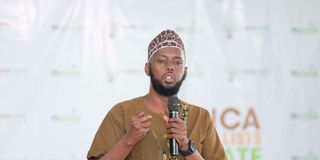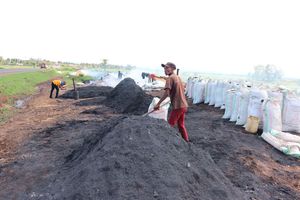‘My life on the climate frontline and why advocacy is close to my heart’

Mohamed Adow, founder and director of Power Shift Africa, a climate think tank
What you need to know:
- For centuries, my community had lived comfortably off its livestock.
- When recurrent climate change-induced drought started killing our camels, cattle and goats, I knew our only lifeline was under an infernal threat.
"My existence has been a complex combination of chance and predetermined outcomes, where optimism and pessimism have intertwined. However, I have always possessed a strong determination to improve my own situation and that of those around me.
I was brought up as a herdsman in the most barren, isolated, impoverished, and marginalised area of Northern Kenya, which borders Somalia on the east and Ethiopia on the north. My destiny, like that of my fellow pastoralists, was predetermined from birth: a life of nomadism. I was expected to travel with my family's livestock in search of water and grazing areas for the rest of my days.
For centuries, my community had lived comfortably off its livestock. When recurrent climate change-induced drought started killing our camels, cattle and goats, I knew our only lifeline was under an infernal threat. Now, we rely on food and cash handouts for survival.
This is how I ended up in the humanitarian world as my first job at Northern Kenya charity, Northern Aid, before moving on to a British organisation, Christian Aid. At the charity, where I quickly rose to become the global climate policy lead, I was driven by one desire: to offer hope and support to members of my community and others in need of relief.
From drilling boreholes to supplying food packets and other forms of relief for pastoral communities, I had dived right into the heart of humanitarian work. Ironically, my community had lived off their livestock for centuries, barely needing external assistance.
Despite increased relief efforts, the demand for aid couldn't be met, leading to dependency and vulnerability to climate change. My community's century-old way of life was at risk and a solution was needed.
No matter how much support you give a community, failure to address the root cause of their tragic circumstances brings them to eternal suffering. My community’s food and cash handouts were precisely doing this: dealing with immediate hunger and not slaying the real monster: climate injustices and historical marginalisation.
This discovery was a wake-up call to me. I was fired up to do something that would change the course of my community, Kenyans and Africans. This was the rationale for founding Power Shift Africa as a vehicle to address hunger, energy inequity, climate-induced poverty, and all the underlying issues and injustices.
At Power Shift Africa, I set out to build the collective moral, economic and political voice of 1.2 billion Africans to mobilise African leadership and the international community around more ambitious climate action goals.
Winning the Climate Breakthrough Award in 2020 shifted the trajectory of my career as a climate champion as my determination went on a rampage. Five years later, Power Shift Africa has grown in leaps and bounds, participating in and hosting continental and global multilateral engagements and influencing the discourse on renewable energy, food security, adaptation and resilience.
We have run several campaigns with allies, including notably ‘‘Don’t Gas Africa’’, which pushes for the phase-out of fossil fuels and the phase-in of renewables with which Africa is infinitely endowed.
Last month, together with African experts, we released a groundbreaking report on how Africa can chart a new path of development by tapping into its limitless natural and manpower resources.
Co-authored by a team of leading global scholars, climate champions and reputable policy specialists, the ‘‘Just Transition’’ report demonstrates that the continent can develop in a low-carbon manner by exploiting its vast wealth of renewable energy.
Kenya’s President William Ruto urges innovative solutions for development and climate change, acknowledging poverty's roots in lack of education, healthcare, and infrastructure investment. Climate change exacerbates issues like droughts, flooding, and failed crop seasons. Energy poverty, bad governance and human rights abuses add to the challenge of creating a better planet.
It also highlights the level of debt owed by those who bear the greatest responsibility for climate change. The climate culpability by Global North countries can only be settled through payment of the climate debt owed to poor nations.
While daunting, these challenges give me a fire in my belly to advocate more fiercely for a more climate-just, food-secure, energy sovereignty and a sustainably developed world for all.
I grew up on the frontline of climate change as a victim. Today, I am on the frontlines, championing climate justice. More than anything, this cause lends meaning to my existence."
Mohamed is the founder and director of Power Shift Africa, a climate think tank





